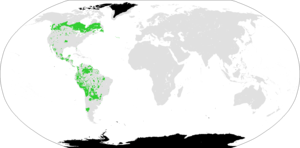
Back Amerindiese tale Afrikaans Llingües amerindies AST Amerind dilləri Azerbaijani آمریند دیللری AZB আমেরিন্দীয় ভাষাসমূহ Bengali/Bangla Amerindische Sprachen German Αμερινδιάνικες γλώσσες Greek Amerinda lingvaro Esperanto Lenguas amerindias Spanish Amerind-kielet Finnish
| Amerind | |
|---|---|
| Geographic distribution | Americas |
| Linguistic classification | Proposed language family |
| Subdivisions |
|
| Glottolog | None |
 Present distribution of proposed Amerind languages | |
Amerind is a hypothetical higher-level language family proposed by Joseph Greenberg in 1960 and elaborated by his student Merritt Ruhlen.[1][2][3][4] Greenberg proposed that all of the indigenous languages of the Americas belong to one of three language families, the previously established Eskimo–Aleut and Na–Dene, and with everything else—otherwise classified by specialists as belonging to dozens of independent families—as Amerind. Because of a large number of methodological disagreements with the 1987 book Language in the Americas, the relationships he proposed between these languages have been rejected by the majority of historical linguists as spurious.[5]
The term Amerind is also occasionally used to refer broadly to the various indigenous languages of the Americas without necessarily implying that they are a genealogical group. To avoid ambiguity, the term Amerindian is often used for the latter meaning.